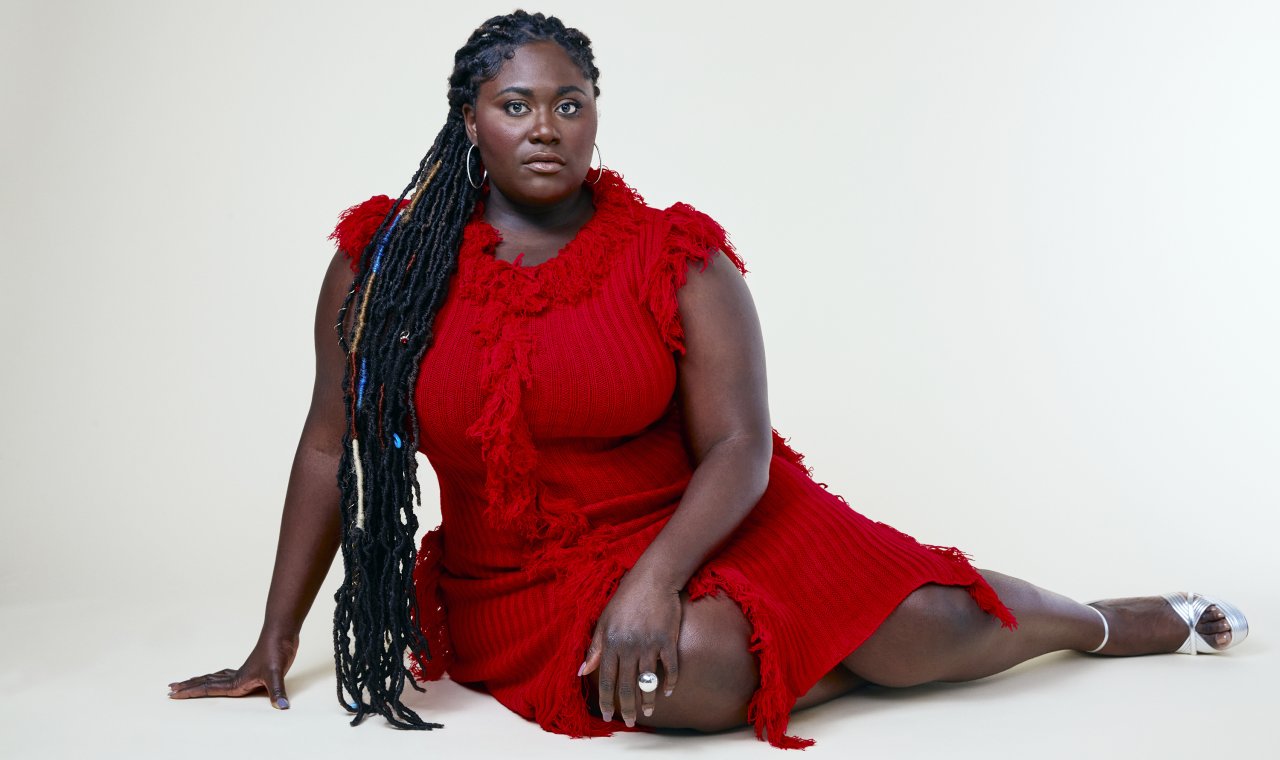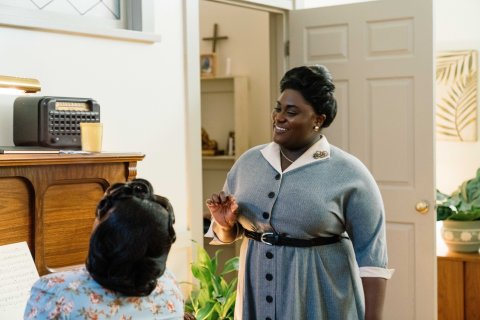
"The crossover between the '50s and '60s to today is so parallel and in such a scary way."
Danielle Brooks was preparing to play Mahalia Jackson, the Queen of Gospel, long before she got the part in Lifetime's Robin Roberts Presents: Mahalia (April 3). "I was consciously reading, watching clips, just getting inspired. And that was before reading any script. I was like, 'I want to be ready to get ready.'" Directed by Kenny Leon, who Brooks calls an "actor's director" because he makes "sure that everybody's voices are being heard," Mahalia follows the course of Jackson's life, from commercial success to her role in the Civil Rights movement with Martin Luther King Jr. at the 1963 March on Washington. "I appreciate the fact that Martin listened to a Black woman," Brooks says. "I've always been enamored of the relationship between Martin and Mahalia because I feel like it gets ignored a lot." Brooks credits having a "seat at the table" on a film like Mahalia with her break on Netflix's Orange Is the New Black, which she says showed her the impact her work could have on others. "I'm proud to have come from a show that knows what we do really does go beyond the paycheck and beyond getting to buy your mama a house."
Do you feel like you were preparing to play Mahalia Jackson years before the role came your way?
I definitely was. I'm a big believer in putting in the atmosphere what you want. So I was consciously reading, watching clips, just getting inspired and motivated the whole way through. And that was before reading any script, having any director, having any company to partner with. I was like, "I want to be ready to get ready."
How did the role come your way?
I was walking in South Carolina—it was the start of the pandemic, and I had ended up staying at my mom's house to make sure baby girl was okay—and [Kenny Leon, the director] calls me and he's like, "I want you to play this. We have a script and if you want to jump in, let's do this thing." I just love him so much, he's such an actor's director. He's so generous with making sure that everybody's voices are being heard. I am grateful to work with a director that the ego is nonexistent. So that was really cool. And I thought about it and was like, even though I knew I wanted to play Mahalia, I just wanted to make sure I was making the right move. I feel like I did it for sure.

How do you prepare to play such an iconic figure?
It was really about knowing that people are going to have their opinions regardless of what you do—whether it's great or not, people always are going to have something to say, and you just have to push through and know what God has given you and told you is for you and be at peace with that. That was the big thing for me. There were definitely moments where I'm like, she was called the Queen of Gospel music, she influenced Aretha Franklin, who in turn has influenced people like Jennifer Hudson and on and on. Can I do it? Vocally, can I even do it? I just had to push fear to the side and just step into it. First, trust yourself and then trust people like Kenny and [producer] Robin Roberts; they say you are the person, you can do this. But also I don't want to discredit myself, because you went to school girl, you have the toolbox to back it up. There was definitely pressure on the music side. I had this huge fear of being judged vocally as a singer, and I just continuously try to push through that.
Can we just take a moment to recognize you had a child at the beginning of the pandemic, and then 4 months later you began work on Mahalia. How did you handle that?
Yeah, nothing in my life seems to be easy. That was the challenge because I also came on as a co-executive producer. I've been producing a few things here and there, but this was the first time I was given a true seat at the table. I have a great nanny, but she can't work 24/7. So I would get home at 11 o'clock and then wake up at 4 a.m. to go over the lines for that day. Then I would get in the van at six or seven to go to work and have a full day. On top of that, we were also trying to make sure that the script was right because unfortunately, one of our challenges was that our beloved writer, Bettina Gilois, passed away. So there were a lot of challenges.
When did you have time to prepare vocally?
We did one week in Atlanta with our music director, Matt, and we pre-recorded the music in case we needed it. But most of the stuff I was singing live, like 80 percent of the music. But the pre-recording was my time to go in and find all of the textures of her voice and let me tell you, it was crazy. One day I was singing, and it wasn't right. Kenny is like, "It's great!" I was like, "Call your mama, play for your mama." He plays it for his mom and she says, "Oh, that's supposed to be Mahalia? You half got it." And that's what I said. I told y'all! So we just kept working until we got it. For me, it was getting rid of that Juilliard training and pronouncing everything right. Like I'm saying "children" instead of "chirren" and those little things, I had to really focus on just letting the words flow out of my mouth and really singing from the heart and really reminiscing on the pain. What she did go through, especially during the Civil Rights and losing the opportunity to have children, she felt tugged on, you know? So I just kind of had to keep going back to where is she singing from.
Mahalia's performance at the 1963 March on Washington was such a pivotal event, not only for her but for history. What were you feeling doing those scenes?
I appreciate the fact that Martin listened to a Black woman. The course of history completely has changed because of that one decision to say, you know what, I'm going to listen to Mahalia. That moment is always just so powerful and meant something to me. So I don't feel like I had to reach too far to take in what that could have been like if I were there. I think for me, I've just always been enamored and interested in the relationship between Martin and Mahalia because I feel like it gets ignored a lot.
How did the events of this past year impact the importance of the production? And were there any parallels between Mahalia's experiences and what's going on today?
The crossover between the '50s and '60s to today is so parallel and in such a scary way. I just think about raising a child at this time and how stressful it has been dealing with this racial pandemic but also trying to find hope. That's the big struggle for me now—raising a Black child in this world. She is the hope, she is my hope and she is the thing that's gonna get us over. But also, I have to be that example. So getting to step into Mahalia is such a huge deal to me because my daughter gets to see where she's coming from, but also gets to see that through her mom. I'm really grateful for getting to pay homage to the people that were hitting the pavement for us.
Your character's storyline on Orange Is the New Black was the emotional center of the show for me and frankly showed a lot of the injustices done to incarcerated women of color in the U.S. Now that the show is over, what, for you, has been the impact of your character's story?
Definitely, I think what was most enjoyable was when we actually got to meet people that were incarcerated and how proud they were to have finally felt like their voices were being heard. I think that was the most rewarding part of it all. That was my first time on a [TV] show, and I'm glad it was my first experience because it really helped me shape my career in a different way than I would have ever done. I'm just proud to have come from a show that knows what we do really does go beyond the paycheck and beyond getting to buy your mama a house.
About the writer
A writer/comedian based in Los Angeles. Host of the weekly podcast Parting Shot with H. Alan Scott, ... Read more














